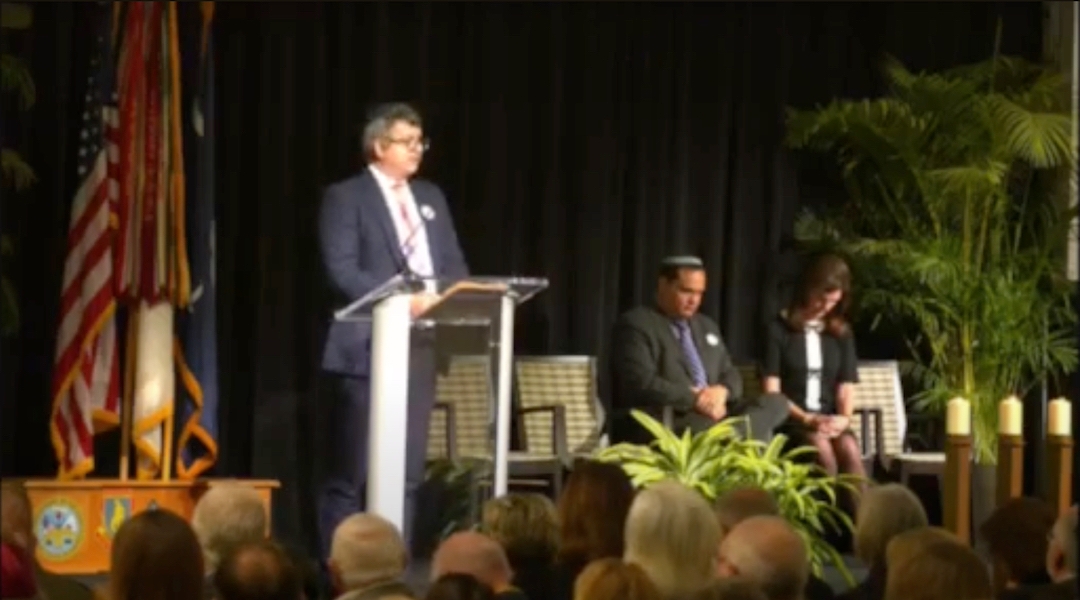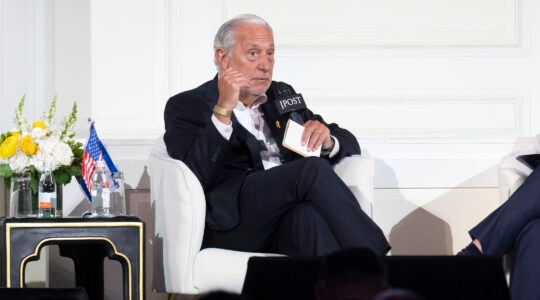A rabbi in South Carolina used the occasion of a Holocaust memorial ceremony to draw parallels to modern-day federal and state policies on refugees, LGBTQ issues and book bans — only to have his speech cut out of the state public television station’s archived video of the event.
Rabbi Sam Rose took to social media to blast the station for cutting his speech, calling it “state sanctioned censorship.”
Those behind the broadcast said the decision to pull the segment actually came from the South Carolina Council on the Holocaust, a state-operated Holocaust education initiative, which had hosted the event and hired the TV station to make the recording.
“We do not believe the political statements made during the benediction were appropriate for a standard-aligned educational resource and therefore requested that portion be removed from the final production,” the state council said in a statement.
The council defines itself as “an apolitical governmental entity” that strives to help teachers in the state “instruct their students about the facts and historical significance of the Holocaust.”
The incident plays into a long-running debate over when, if ever, it is appropriate to compare current events to the Holocaust. Some Jewish groups have historically condemned politicians and activists who draw parallels to the Holocaust era, though such objections were falling away by the end of Trump’s first term, as Nazi analogies became more commonplace in politics.
Requests for comment to the council were not immediately returned. Rose said one member of the council’s board who belongs to his synagogue, Temple of Israel in Greenville, drafted a resignation letter after the speech was pulled because “she did not want to sit on a council that was going to serve as a moral license to engage in state-sanctioned hatred.” (The letter has not yet been submitted, he said.)
Speaking to the Jewish Telegraphic Agency, Rose denounced both the council and South Carolina ETV, the statewide PBS affiliate, as cowardly. He also defended his decision to use the Holocaust ceremony to sound off on contemporary issues.
“There was no way that I was going to allow for these public officials to be self-congratulatory and to use this event as a platform for moral licensing, where they’re going to justify their discriminatory behavior towards other groups of people, while congratulating themselves and writing state proclamations about Holocaust education,” he said.
The rabbi added that he’d written his rabbinical school thesis on the subject of how the Reform movement has addressed “controversial political issues” in the past. The denomination has a long history of participation in American social justice movements.
He added that he felt an obligation particularly toward the trans members of his congregation to speak out on their behalf.
“I think they’re legitimate parallels,” he said. “The Holocaust didn’t start with death camps. The Holocaust started with the censoring of the media, with the censoring of religious figures, with the censoring of books and burning them. The Holocaust started when you started calling people out for being different and as the source of the ills of society.”
A representative for the public broadcaster, SCETV, directed JTA to a statement it appended to its archived video of the broadcast, asserting that it had aired the livestream uninterrupted before later editing it: “Following the event, it was requested the program be archived in a way that best aligns with the Council’s goals for future accessibility and educational use.”
The station’s statement added, “As a public media entity, we do not engage in any form of censorship with our content.”
The event, billed as the “80th Commemoration of the Liberation of Auschwitz,” was hosted by the council on Jan. 27, International Holocaust Remembrance Day, on the campus of the University of South Carolina in Columbia. It included Chuck Todd, the Jewish former longtime host of NBC’s “Meet the Press,” as a keynote speaker days before he announced he was leaving NBC. The Republican governor, lieutenant governor, and state superintendent of schools were also in attendance, and a Holocaust survivor spoke.
Rose, a longtime community organizer who said he grew up with both a Holocaust survivor relative and a gay father, has lived in Greenville for six years. He had been invited to recite the Mourner’s Kaddish and deliver a benediction at the ceremony’s conclusion, and decided to use the opportunity to directly address the state’s leadership. He declined to share his remarks ahead of time with event organizers, fearing censorship.
Rose’s speech came days after Bishop Mariann Budde, an Episcopalian leader, delivered a sermon from the pulpit challenging President Donald Trump to “have mercy” on vulnerable populations. Liberal clergy across the country have said they were inspired by her choice.
Following the prayer, Rose instructed the crowd to be seated and launched into his speech, during which he sought to tie the Holocaust to “the attacks on human rights and human lives which echo a dangerous refrain.”
“In our time we are witnessing a resurgence of hate, of antisemitism, of prejudice, of discrimination,” the rabbi said, in a video he later posted to YouTube himself. “Our country, which has served so often as a beacon of hope to those suffering around the world, is now, as of this week, refusing aid of any kind to refugees.”
He then implored attendees to visit the website of HIAS, the Jewish immigrant and refugee aid group, which has been open about its struggles to continue to fulfill its mission after Trump’s recent freezing of federal funds for refugee assistance.
“If the Holocaust happened and ended yesterday, would the same Jews who were let in this country be let in today?” Rose continued. He then moved onto LGBTQ issues, referencing Trump’s recent executive orders that recognize only two official sexes and bar transgender health care for minors: “My friends, my neighbors, my colleagues who are members of the LGBTQ+ community, are terrified right now.”
Rose then briefly pivoted to the issue of book bans, especially potent in South Carolina as one of the leading states for book challenges. “When we talk about education and the censoring of things where we need to learn about and legitimize the experience of suffering of other people, books are being taken out of libraries and our children are not being taught the full spectrum of experience in this country,” he said.
South Carolina in recent years has restricted classroom access to some books about the Holocaust and antisemitism. Districts in the state have briefly pulled the novel “The Fixer” from one district prior to a review and pulled a book about local Holocaust survivors from its middle-grade curriculum. The state is currently facing a civil rights lawsuit over a new law restricting the teaching of subjects including race and gender; the state superintendent, who was a featured speaker at the Auschwitz event, is a named party in the suit.
“I was so nervous giving the speech that I was trembling,” Rose recalled on Friday about his speech. “But I was immediately surrounded by people who wanted to give me hugs.”
Only one person told him they objected to the speech, he said, because “he didn’t believe that religion and, in particular, prayer was ever the platform to bring in politics. To which I responded, then you might as well get rid of the Hebrew Bible.”
The injection of modern-day politics into Holocaust commemoration events, which are often attended by political figureheads, has been a subject of controversy for years. Similar ceremonies this year have also been magnets for political grandstanding, as Jews were removed from one commemoration in Dublin for protesting the Irish president lamenting the death toll in Gaza during his remarks. No world leaders were invited to speak at an event this week at Auschwitz to mark the 80th anniversary of its liberation, a date that the United Nations designated as International Holocaust Remembrance Day 20 years ago.
The South Carolina speech wasn’t the only Holocaust memorial controversy to play out this week in the United States. This week a leaked memo from the Defense Intelligence Agency, a wing of the Pentagon, instructed staff to pause all activities related to the commemoration of Holocaust Day of Remembrance and other activities the agency deemed representative of diversity, equity and inclusion initiatives, or DEI, now banned from the federal government via a Trump executive order.
Rose has harsh words for the South Carolina Council on the Holocaust, which the state created in 1989, because it exists in parallel with the state’s other education policies suppressing the teaching of racial history and the recognition of children’s gender identities.
“They believe that by talking about Holocaust education, it gives them license to ignore every other political issue of suffering in their educational processes,” he said.
This week the Trump-appointed chair of the Federal Communications Commission also announced a broad investigation into NPR and PBS that could lead to their funding being revoked, putting public broadcasters on edge.
JTA has documented Jewish history in real-time for over a century. Keep our journalism strong by joining us in supporting independent, award-winning reporting.






